Key takeaways:
- Recognizing personal productivity peaks and establishing clear editing goals significantly enhances focus and reduces burnout.
- Creating a structured editing schedule, including dedicated work blocks and regular breaks, fosters creativity and minimizes stress.
- Minimizing distractions through a designated workspace, turning off notifications, and incorporating background music promotes better concentration.
- Evaluating progress and seeking feedback during the editing process leads to timely adjustments and improved final outcomes.
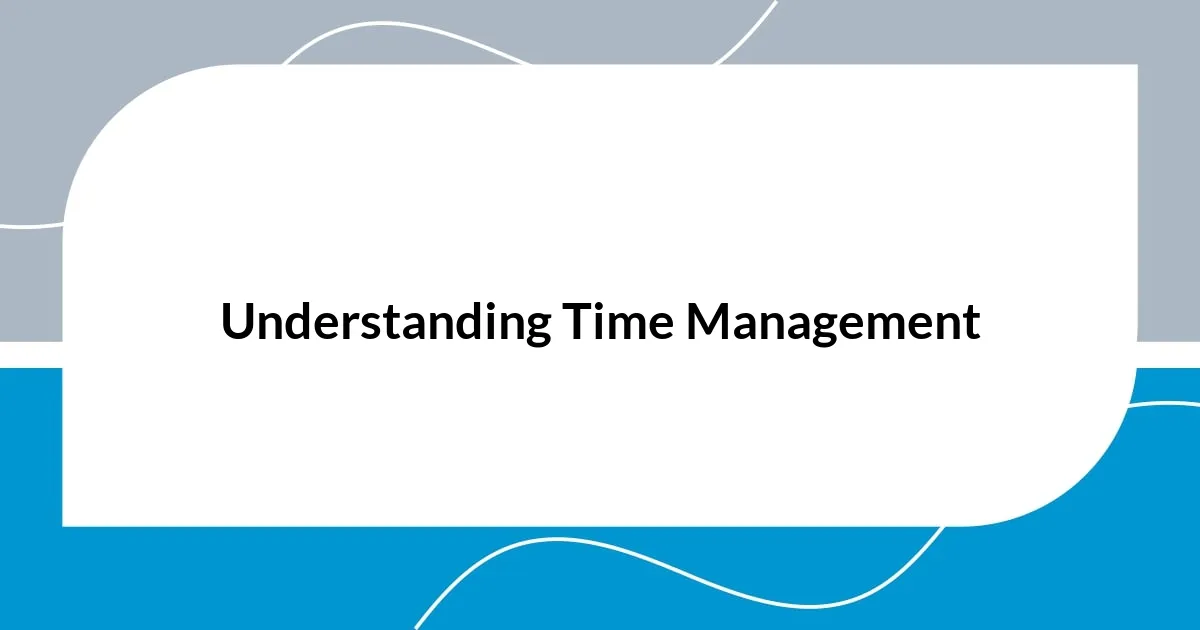
Understanding Time Management
Understanding time management is really about recognizing the value of each moment. Personally, I’ve had days where I felt like I was drowning in editing tasks, only to realize that I hadn’t set clear priorities. When I take a step back, I often ask myself, “What truly needs my attention right now?” This question always brings clarity, helping me focus on what matters most.
I’ve also learned that time management isn’t just about scheduling; it’s about understanding my own rhythms and productivity peaks. For instance, I know I’m most alert in the mornings, so I save complex editing tasks for that time. How often do we work against our natural inclinations? By embracing my peak energy times, I’ve noticed a significant boost in both the quality and efficiency of my work.
Another aspect that often gets overlooked is the emotional component of managing time. There have been instances when I felt overwhelmed—like a tight deadline was looming over me. In those moments, I’ve found it helpful to pause, breathe, and remind myself of my past successes. Reflecting on previous tight situations that I successfully navigated not only calms my nerves but also inspires me to harness my time wisely. What strategies have you found effective in tapping into your emotional resilience during busy periods?
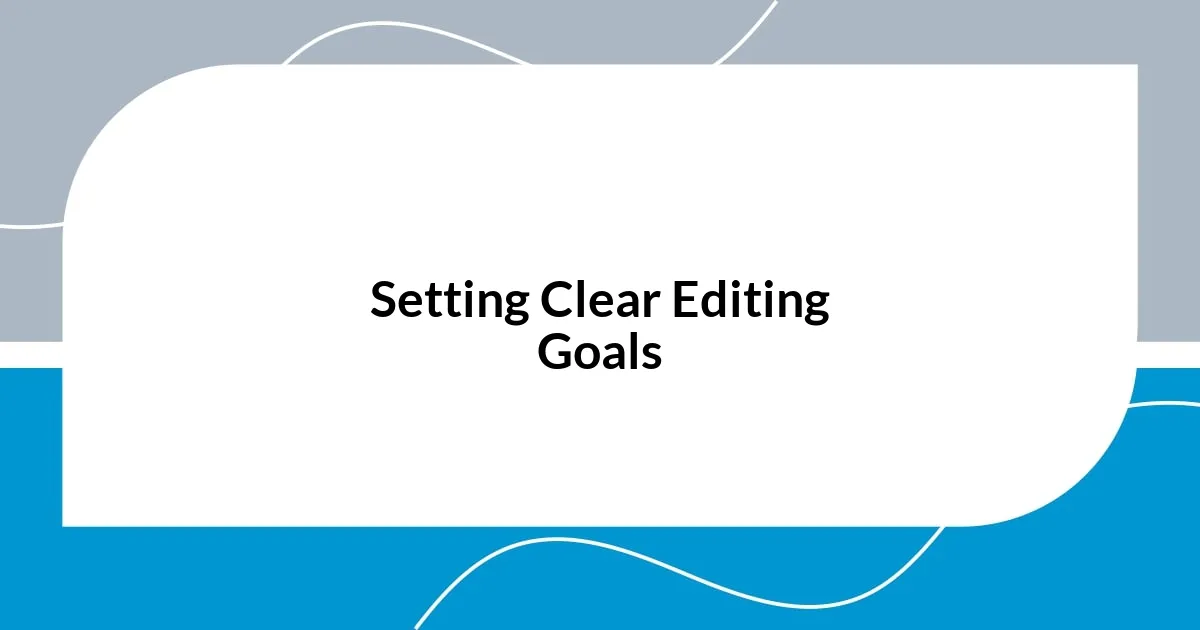
Setting Clear Editing Goals
Setting clear editing goals is essential for effective time management. I remember a time when I jumped into a project without setting specific goals, my editing process became a chaotic blur. By clearly defining what I aimed to accomplish—like completing three specific sections each day—I gained clarity and direction, which transformed a daunting task into a manageable plan.
When I establish my editing goals, I also ensure they are realistic and achievable. In my experience, aiming for overly ambitious targets can lead to frustration. For example, I once set a goal to edit a 20-page document in one sitting, which only resulted in burnout. Instead, breaking it down into smaller sections allowed me to stay focused and maintain a high standard of quality throughout the process.
To keep myself accountable, I often write down my goals in a visible place. This simple act not only reminds me of my objectives but also motivates me to stay on track. Have you ever tried this? I found it helpful to review my goals at the end of each day, celebrating the progress I made, no matter how small. It’s a fantastic morale booster, making the editing journey much more enjoyable.
| Editing Goals | Benefits |
|---|---|
| Specific Sections to Edit | Increased Focus |
| Realistic Targets | Reduced Burnout |
| Daily Progress Reviews | Boosted Morale |
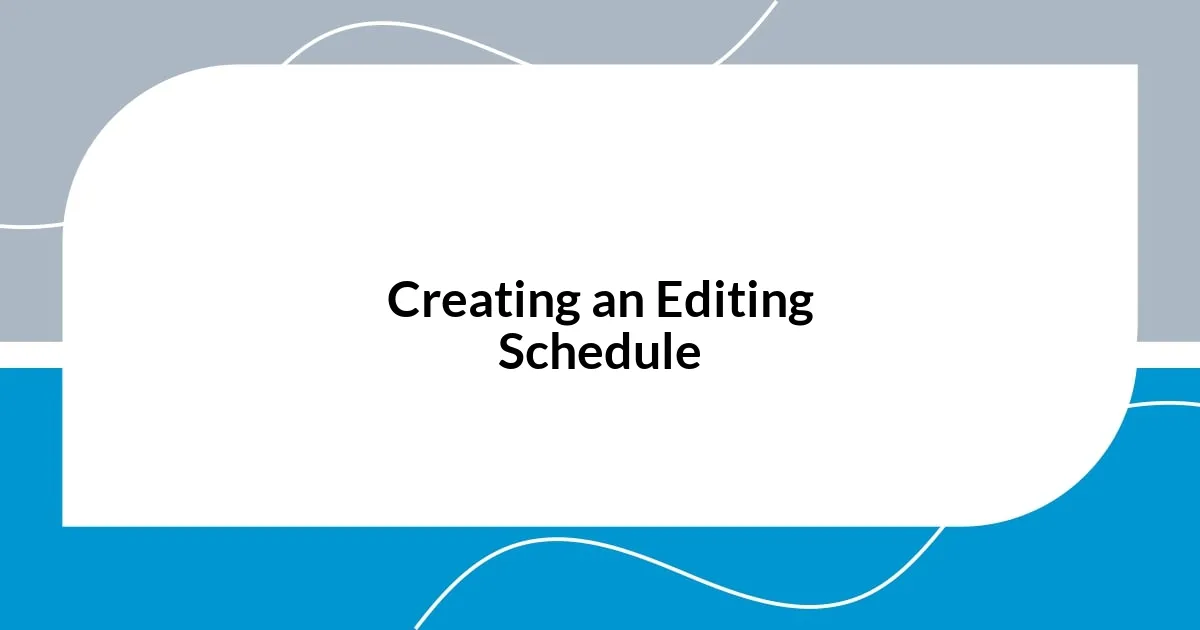
Creating an Editing Schedule
Creating an effective editing schedule can be a game-changer. I remember a project where I didn’t structure my time properly and ended up feeling overwhelmed by looming deadlines. Now, I block out specific hours for editing each week, which helps me manage my workload. This approach not only keeps me organized but also lets my creativity flow without distractions. I’ve discovered that allocating time for breaks is crucial too, as it prevents burnout and keeps my mind fresh.
Here’s how I typically structure my editing schedule:
- Weekly Planning: Each Sunday, I outline what I want to achieve in the upcoming week.
- Dedicated Time Slots: I reserve certain hours during the day solely for editing—these are untouchable!
- Break Intervals: I ensure I include short breaks within my editing sessions to recharge.
- Flexible Adjustments: Life happens; I leave room in my schedule for unexpected tasks or changes.
- Review Sessions: At the end of each week, I reflect on what worked and what didn’t, refining my approach accordingly.
By understanding the importance of this structured schedule, I’ve significantly reduced stress and improved the quality of my edits. Engaging in this process feels like I’m not just managing time; I’m truly valuing it.
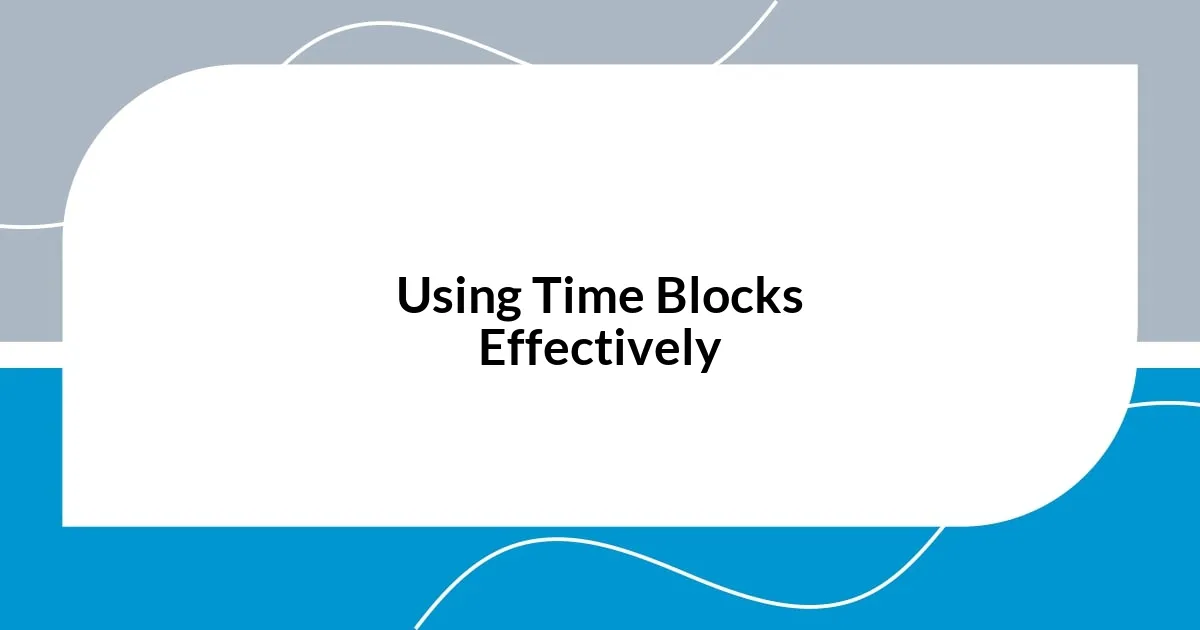
Using Time Blocks Effectively
Using time blocks effectively is like giving structure to the chaos of editing. I recall a specific project where I used time blocks for the first time; it felt almost liberating. By setting aside one-hour segments without interruptions, I found I was able to dive deep into the editing process. Have you ever noticed how distractions can creep in during long sessions? By focusing solely on editing within those blocks, I discovered new nuances that I would have otherwise missed.
It’s interesting how those time blocks also help in keeping my emotional state balanced. I remember feeling burnt out after long days of uninterrupted editing. Now, breaking my tasks into manageable blocks allows me to gauge my energy levels and take a step back when I need it. When the clock ticks down towards a break, I get this little rush of excitement, knowing I’ve pushed through while keeping my creativity intact. Don’t you think breaks punctuating focus lead to richer results?
To further enhance my experience, I started using a timer to manage these blocks. I set it for 25 minutes of focused editing, followed by a 5-minute break. This technique not only bolsters my concentration but also creates a satisfying rhythm to my work. It’s like having a dance with deadlines, where every block is a step towards a polished piece. The moments I spend in those breaks often inspire fresh ideas, making me wonder how I ever edited without this structured approach before.
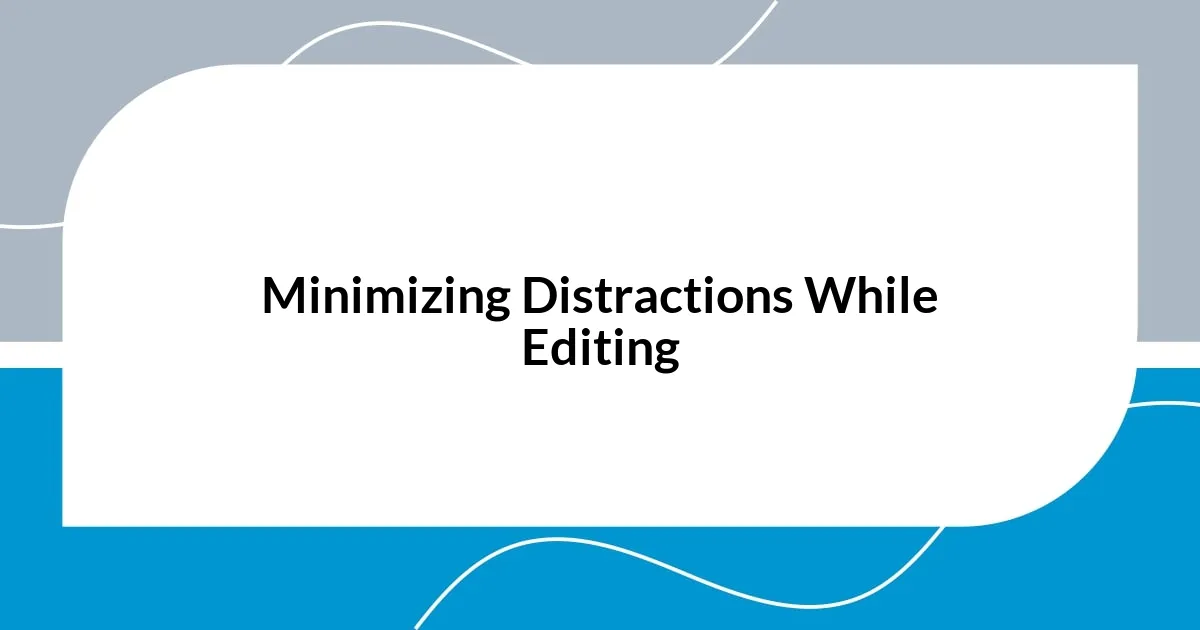
Minimizing Distractions While Editing
Minimizing distractions while editing is essential for maintaining focus and enhancing productivity. One strategy I rely on is creating a dedicated workspace. I once sat down to edit in a cozy corner of my living room, only to be distracted by the TV blaring in the background. Now, I have a specific area designated for editing—free of clutter, noise, and chaos. This small change transformed my focus. Does your environment help or hinder your productivity?
Another effective technique is to turn off notifications on my devices. I vividly remember working on a tight deadline when my phone buzzed with messages. Each ping pulled me out of the editing flow, and I’d waste precious time getting back on track. Since then, I’ve adopted a “do not disturb” mode during editing sessions, which shields me from interruptions. It feels empowering to take control of my environment. Have you ever experienced that moment of peace when distractions fade away?
Finally, I’ve found that utilizing background music can be incredibly helpful for blocking out distractions. There was a time when I edited in silence, feeling the weight of every little noise around me. Now, I play instrumental music or ambient sounds that create a soothing atmosphere. It’s fascinating how just a few notes can transport me into a focused state—almost like meditation. What about you? Have you explored how sound affects your editing experience?
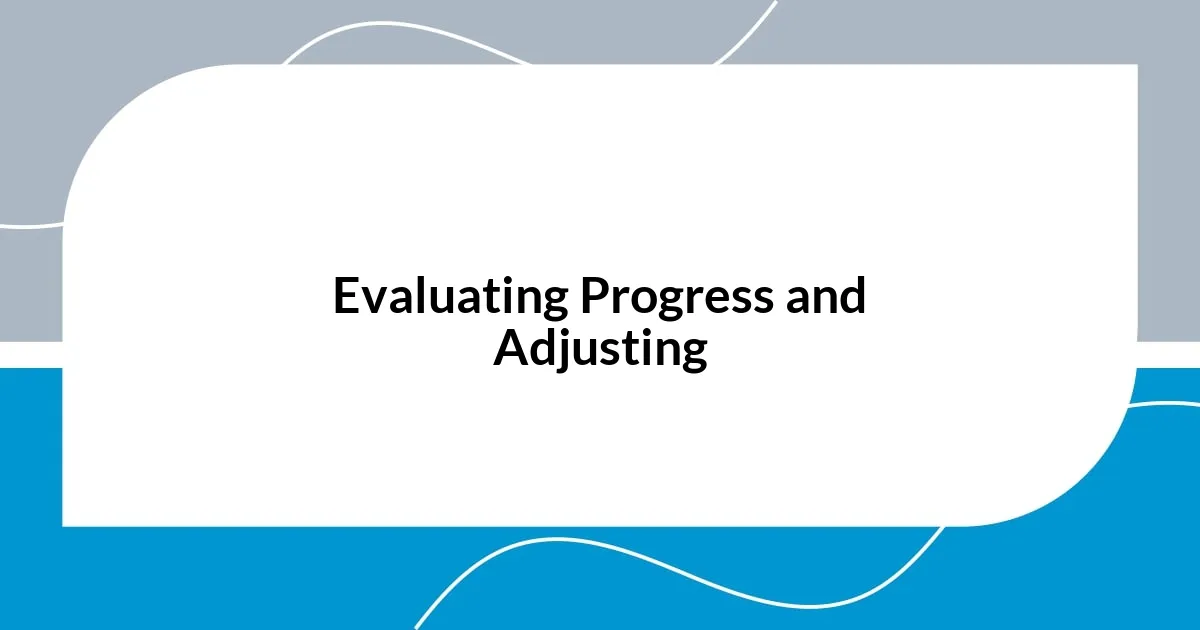
Evaluating Progress and Adjusting
Evaluating my progress while editing is crucial for staying on track and making necessary adjustments. I’ve often found myself midway through a project, wondering if my work aligns with my initial vision. This introspection can be eye-opening; it forces me to ask, “Am I missing the essence of what I’m trying to convey?” Taking a moment to assess my work not only highlights areas needing improvement but also reaffirms what’s working well.
I remember a time where I was deep into an editing marathon. I tracked my progress using a simple checklist, marking off each section as I completed it. One day, I paused and noticed I was falling behind on my schedule. Instead of pushing through aimlessly, I decided to revise my timeline and refocus my efforts on the more complex sections. This flexibility not only reduced my stress but also led to a more polished final product. Have you ever felt the relief of adjusting your plan mid-project?
Additionally, I often seek feedback from peers or mentors at various stages of my editing process. It’s so valuable to hear another perspective, and sometimes my own view can become clouded. Once, a colleague pointed out that I was over-editing certain parts of my piece. It felt uncomfortable at first, but their insights helped me streamline my work and hit the mark more effectively. Isn’t it refreshing to realize that collaboration can elevate our progress and lead to a more refined outcome?
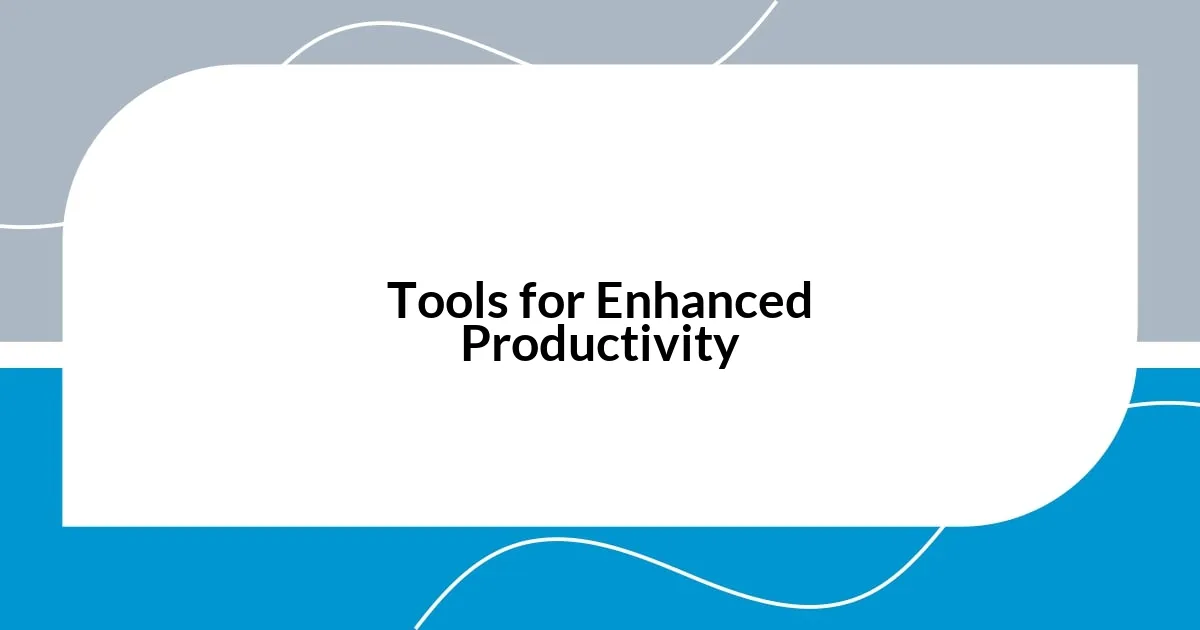
Tools for Enhanced Productivity
One of my go-to tools for enhancing productivity is project management software. I vividly recall a challenging editing project where I relied on a simple app to create a timeline. By breaking my tasks into smaller, manageable chunks, I could clearly see what needed to be done and when. It was like lighting a path through a maze—I felt a sense of control knowing I was progressing steadily. Have you ever used a digital tool to help visualize your workflow?
I’ve also discovered the power of using editing software that incorporates tools for annotations and comments. There was a time when I edited with pen and paper, and it was both messy and inefficient. Transitioning to digital editing allowed me to capture my thoughts right alongside my work. This immediacy transformed my process into a more fluid conversation with my text. I couldn’t believe how much smoother my revisions became. Have you experienced the relief that comes from having everything in one place?
Additionally, I find browser extensions for productivity incredibly helpful. On one occasion, I was drowning in tabs while trying to edit. This distracted me more than I realized! After installing an extension that limits open tabs, my editing sessions became calmer and more focused. I could channel my energy into the actual editing instead of hopping between distractions. Have you ever thought about how your digital habits might impact your editing flow?